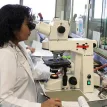
Rapid rise of coronavirus SARS-CoV-2 spike mutation T478K found in Mexico and several European countries
We report the distribution of the Spike mutation S:T478K and its recent growth in prevalence in the SARS-CoV-2 population. While there is currently no report of association of this variant with clinical features, S:T478K’s rapid growth may indicate an increased adaption of SARS-CoV-2 variants carrying it, particularly lineage B.1.1.222.
The distribution of this mutation is higher in North America, but we could detect it also in several European countries. The location of S:T478K in the interaction complex with human ACE2 may affect the affinity with human cells and therefore influence viral infectivity.
We detected this growth starting at the beginning of 2021, and S:T478K is, at the time of writing (March 26, 2021) characterizing almost 2.0% of all sequenced SARS-CoV-2
An in silico molecular dynamics study on the protein structure of Spike has predicted that the T478K mutation, substituting a non-charged amino acid (Threonine) with a positive one (Lysine) may significantly alter the electrostatic surface of the protein, and therefore the interaction with ACE2, drugs or antibodies, and that the effect can be increased if combined by other co-occurring Spike mutations.
Another experiment showed that T478K and T478R mutants were enriched when SARS-CoV-2 viral cultures were tested against weak neutralizing antibodies, highlighting, at least in vitro, a possible genetic route the virus can follow to escape immune recognition. Everything considered, we believe that the continued genetical and clinical monitoring of S:T478K and other Spike mutations is of paramount importance to better understand COVID-19 and be able to better counteract its future developments.





